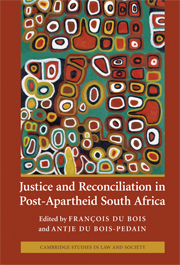Book contents
- Frontmatter
- Contents
- List of tables and figures
- List of contributors
- Acknowledgements
- List of abbreviations
- Introduction
- 1 Reconciliation as surrender: configurations of responsibility and memory
- 2 Radical forgiveness: transforming traumatic memory beyond Hannah Arendt
- 3 Communicating criminal and political responsibility in the TRC process
- 4 The contribution of criminal justice
- 5 Reparation and the forms of justice
- 6 Land restitution and reconciliation in South Africa
- 7 For justice and reconciliation to come: the TRC archive, big business and the demand for material reparations
- 8 Transition, forgiveness and citizenship: the TRC and the social construction of forgiveness
- 9 The evolving legitimacy of the South African Constitutional Court
- 10 Drawing the line: justice and the art of reconciliation
- 11 Post-conflict justice and the reconciliatory paradigm: the South African experience
- Index
- References
Introduction
Published online by Cambridge University Press: 01 July 2009
- Frontmatter
- Contents
- List of tables and figures
- List of contributors
- Acknowledgements
- List of abbreviations
- Introduction
- 1 Reconciliation as surrender: configurations of responsibility and memory
- 2 Radical forgiveness: transforming traumatic memory beyond Hannah Arendt
- 3 Communicating criminal and political responsibility in the TRC process
- 4 The contribution of criminal justice
- 5 Reparation and the forms of justice
- 6 Land restitution and reconciliation in South Africa
- 7 For justice and reconciliation to come: the TRC archive, big business and the demand for material reparations
- 8 Transition, forgiveness and citizenship: the TRC and the social construction of forgiveness
- 9 The evolving legitimacy of the South African Constitutional Court
- 10 Drawing the line: justice and the art of reconciliation
- 11 Post-conflict justice and the reconciliatory paradigm: the South African experience
- Index
- References
Summary
Justice and Reconciliation in Post-Apartheid South Africa takes stock of the transitional processes which have been under way in South Africa since the early 1990s to transform the country into a stable and just society – a transformation which is still ongoing. The epithet ‘post-apartheid’ hints at a specific period of South African history, designating both a beginning and – though perhaps less obviously so – an expected ending. The start of this period can, roughly, be connected with the irreversible decision to dismantle apartheid as a form of social and political organisation, taken by the National Party government in early 1990 and manifested in the release of Nelson Mandela and the unbanning of the ANC and other political organisations. When on 2 February 1990 the then state president, F.W. de Klerk, announced his government's intention to free the best-known leader of its most prominent political foe and to commence negotiations with hitherto outlawed opposition groups regarding South Africa's constitutional future, the ending of the old order became official policy. To be sure, this was neither fully a beginning nor truly an end: it followed on several years of behind-the-scenes contact between leading figures in the apartheid government and Mandela, as well as exiled ANC leaders; and more years of negotiations were to ensue in which the government tried its hardest to minimise the extent of change.
- Type
- Chapter
- Information
- Publisher: Cambridge University PressPrint publication year: 2009
References
- 1
- Cited by



